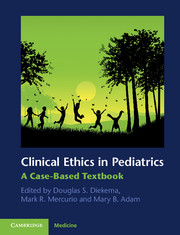Book contents
- Frontmatter
- Contents
- Contributors
- Preface
- Section 1 Core issues in clinical pediatric ethics
- Section 2 Ethical issues at the beginning of life: perinatology and neonatology
- Section 3 When a child dies: ethical issues at the end of life
- Section 4 Ethical issues posed by advances in medical technology and science
- 25 Minors as recipients and donors in solid organ transplantation
- 26 Enhancement technologies and children
- 27 Cochlear implants and deaf children
- 28 Ethical issues in the treatment of pediatric patients with disorders of sex development
- 29 Sterilizing procedures in minors with cognitive disabilities
- 30 Parental requests for intervention in children with lethal conditions
- 31 Genetic testing and screening of minors
- 32 The introduction of innovative technology into practice
- 33 Human subjects research involving children
- Section 5 Children, public health, and justice
- Section 6 Special topics in pediatric ethics
- Index
- References
31 - Genetic testing and screening of minors
from Section 4 - Ethical issues posed by advances in medical technology and science
Published online by Cambridge University Press: 07 October 2011
- Frontmatter
- Contents
- Contributors
- Preface
- Section 1 Core issues in clinical pediatric ethics
- Section 2 Ethical issues at the beginning of life: perinatology and neonatology
- Section 3 When a child dies: ethical issues at the end of life
- Section 4 Ethical issues posed by advances in medical technology and science
- 25 Minors as recipients and donors in solid organ transplantation
- 26 Enhancement technologies and children
- 27 Cochlear implants and deaf children
- 28 Ethical issues in the treatment of pediatric patients with disorders of sex development
- 29 Sterilizing procedures in minors with cognitive disabilities
- 30 Parental requests for intervention in children with lethal conditions
- 31 Genetic testing and screening of minors
- 32 The introduction of innovative technology into practice
- 33 Human subjects research involving children
- Section 5 Children, public health, and justice
- Section 6 Special topics in pediatric ethics
- Index
- References
Summary
Case narrative
Mr. and Mrs. Smith come to your office with your patient Susan, who is 14 years old, and her little brother Sam, 7 months of age. The last 2 years have been a roller coaster for the Smiths. After 10 years of trying to conceive a second child, they finally succeeded. Although Sam is growing well and appears healthy, he was diagnosed with cystic fibrosis (CF) as part of the state’s newborn screening (NBS) program. More recently, Mrs. Smith was diagnosed with breast cancer and is undergoing chemotherapy. She is the third of three sisters to develop breast cancer by age 40, and genetic testing found that all three sisters have a BRCA mutation.
The Smiths come for Susan’s routine exam. After discussing adolescent immunizations (Tdap, Menactra, and Gardasil), you ask if they have anything they would like to discuss. They ask whether Susan can be tested for CF. On further inquiry, it is clear that they are not worried that she has CF as she is quite tall and has never had any respiratory problems, but they are concerned about whether she is a CF carrier. Mrs. Smith asks whether you can test Susan for the family’s BRCA mutation on the same blood sample.
- Type
- Chapter
- Information
- Clinical Ethics in PediatricsA Case-Based Textbook, pp. 181 - 185Publisher: Cambridge University PressPrint publication year: 2011
References
- 1
- Cited by



